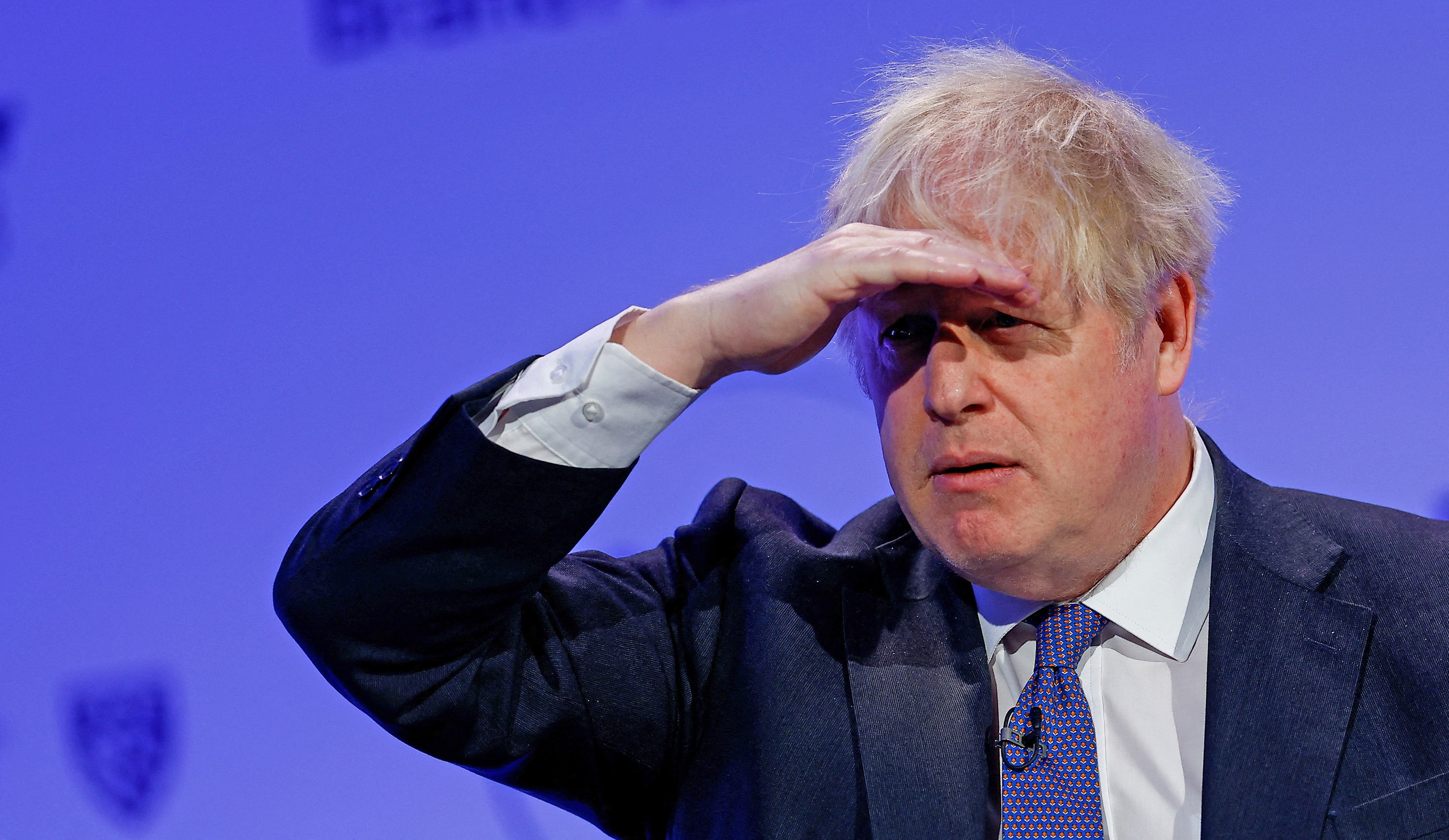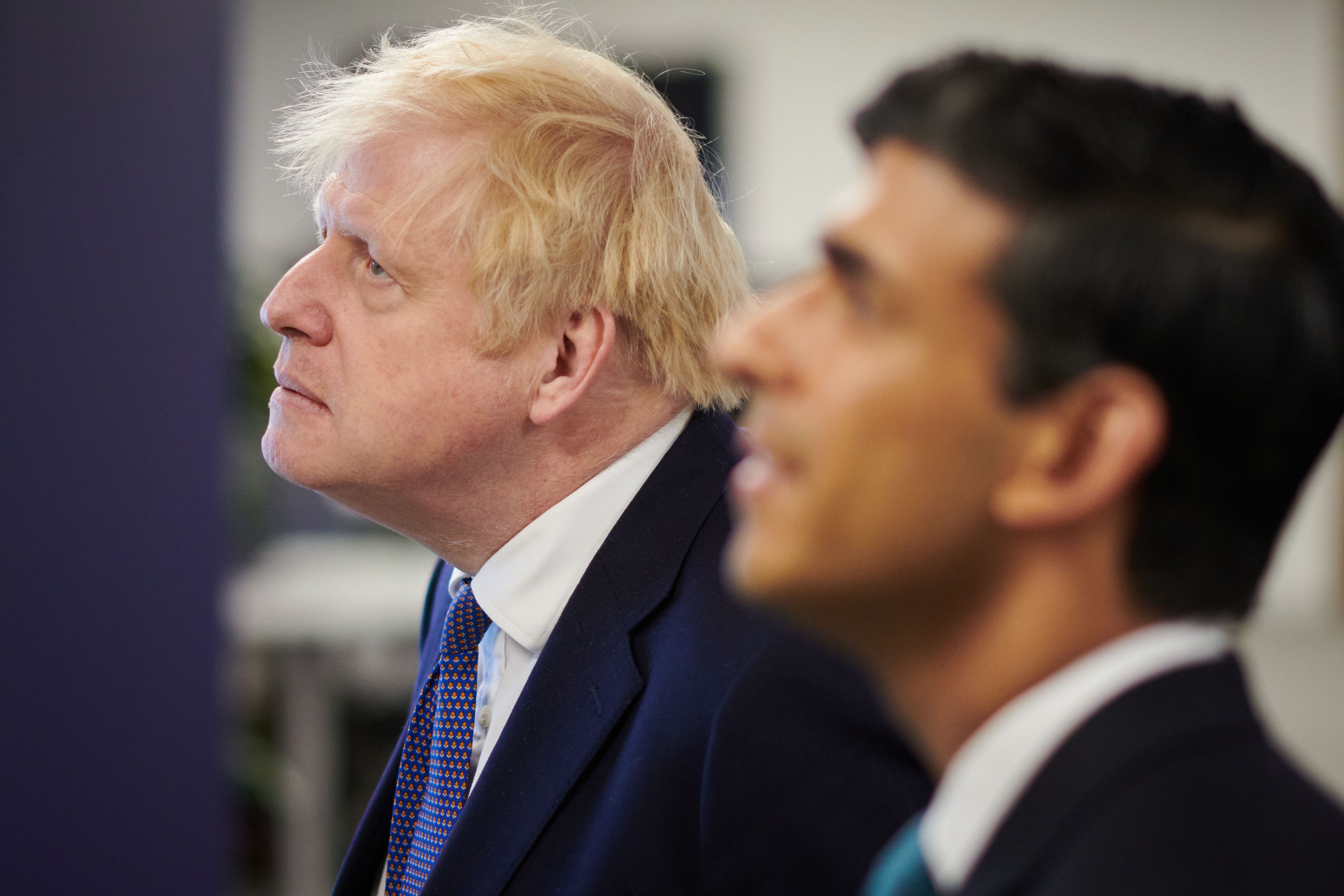Boris breaks silence on Brexit and questions Sunak deal – but concedes PM has ‘momentum’
Former PM says he will find it ‘very difficult’ to vote for Windsor deal struck by Sunak
Boris Johnson has criticised Rishi Sunak’s post-Brexit deal with the EU to resolve the Northern Ireland protocol row – claiming it doesn’t “take back control” from Brussels.
Mr Johnson said it would be “very difficult” to vote for the agreement struck by Mr Sunak, and urged the prime minister to consider using his bill to unilaterally override the protocol if it “doesn’t work”.
The former prime minister told the Global Soft Power Summit in London: “When I looked at the deal we have, I have mixed feelings. I’m conscious of where the momentum is.”
He added: “I will find it very difficult to vote for something like this myself, because I believe we should have done something different, no matter how much plaster came off the ceiling in Brussels.”
Mr Johnson said “we’ve got to hope that it works”, and that he understands why people want to “move on” from the arguments over Brexit and accept the deal. “I get that,” he said.
But, referring to the Northern Ireland Protocol Bill – which has been ditched by Mr Sunak – the former Tory leader added: “If it doesn’t work, I hope we have the guts to deploy that bill again.”
Mr Johnson said he wanted to be “clear about what is really going on here”, adding: “This is not about the UK taking back control, and although there are easements, this is really a version of the solution that was being offered last year to Liz Truss when she was foreign secretary.”
Showing that he has no intention of letting up on the issue, he added: “I will continue to campaign for what I think of as Brexit ... because this is nothing if it is not a Brexit government, and Brexit is nothing if we in this country don’t do things differently.”
He said he hoped the DUP would return to Stormont, despite the party’s own concerns about the Windsor Framework. Referring to DUP leader Sir Jeffrey Donaldson, Mr Johnson said: “I hope he can find a way of reconciling himself and his party [with] getting back to power-sharing.”
The former prime minister also conceded that he had made a mistake in signing up to the Northern Ireland protocol as part of his Brexit deal. The protocol prompted the DUP to walk out of the power-sharing institutions in Northern Ireland because of its provision for the presence of a trade barrier in the Irish Sea.
“I thought those checks would not be onerous since there isn’t that much stuff that falls into that category; most of the goods stay in Northern Ireland,” Mr Johnson said. Muttering, he then added: “It’s all my fault, I fully accept responsibility.”
Mr Johnson – who made a dig at Mr Sunak by saying that the Tories were “only a few points behind” Labour when he stepped down – also urged the PM to slash corporation tax “to Irish levels or lower” ahead of a planned hike from 19 per cent to 25 per cent in April.

Mr Johnson had been urged to “put up or shut up” over the deal, after he was said to be considering joining a revolt by Eurosceptics if one should emerge.
Several MPs told The Independent they expected any rebellion against the deal in the Commons to be limited to around 20 of the staunchest hardliners “at the most”.
Mark Francois, the chair of the European Research Group, has said it could take as long as a fortnight for the Tory Brexiteer group to carry out its own “legal audit” of the deal.
Mr Sunak wants to give the DUP and the Tory Eurosceptics “space and time” to consider the deal before holding a vote in the Commons. A vote could be delayed until after Jeremy Hunt’s Budget on 15 March, according to The Times.
Northern Ireland Office minister Jonathan Caine said on Thursday that some details of the Stormont brake – which would give the Northern Ireland Assembly the power to halt new EU goods law that applies to the country – are “yet to be filled in”.
Lord Caine revealed to his fellow peers that consultation with Northern Ireland parties is imminent, and that legislation will follow.

David Frost, who served as Mr Johnson’s Brexit negotiator, said the protocol changes agreed by Mr Sunak and the EU Commission were “all worth having” – but claimed that the government was “overclaiming” the merits of the deal.
Lord Frost said his criticism “doesn’t mean the deal shouldn’t go ahead”, but added: “It leaves the government still only partly sovereign over all its territory. Just as in 2019, that is a bitter pill to swallow.”
Downing Street said on Thursday that some people are “misunderstanding” the Windsor Framework, as the unionists and backbenchers pore over the details of the deal.
The prime minister is not prepared to make any changes to his landmark deal, it is understood. No 10 said that the government believed it had secured “the right deal for all parties”.
Former European Commission president Jean-Claude Juncker described Mr Johnson as “a piece of work” who had failed to understand that his Brexit deal needed to be more precise.
In an interview with LBC host Andrew Marr, Mr Juncker claimed to have had better relations with all the other prime ministers he had worked with – including John Major, Tony Blair, Gordon Brown, David Cameron, and Theresa May, whom he described as “a lady”.
Mr Juncker said: “Boris Johnson was a piece of work, someone you cannot categorise in normal definitions. But I liked him as a person.”
Join our commenting forum
Join thought-provoking conversations, follow other Independent readers and see their replies
Comments



Bookmark popover
Removed from bookmarks